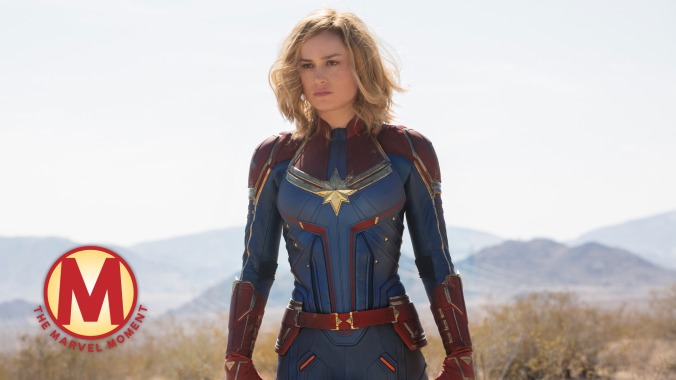Captain Marvel stands her ground, and the MCU welcomes a new kind of hero
Image: Photo: Marvel Film Features The Marvel Moment

Captain Marvel was a game changer for the Marvel Cinematic Universe in more than one way. First, there’s the little matter of it being the first solo film in the series with a female lead, building on the momentum established by Black Panther’s trio of capable female heroes by giving Carol Danvers, a.k.a. Vers, a.k.a. Captain Marvel, an origin story on par with that of her male peers. That is, if they even are her peers: With her flying abilities, superstrength, and power to absorb and project cosmic energies, Captain Marvel is one of the most powerful superheroes in the MCU—and the Avengers’ best hope after the events of Infinity War, as is made clear when Carol returns to C-53 (a.k.a. Earth) following several decades traveling the galaxy in Captain Marvel’s second post-credits scene.
But it’s not just her superpowers that make Carol a formidable force for good. She also represents the power of empathy and unfettered emotion, two qualities that women are often trained to repress in real life, lest they be labeled “too emotional,” or “hysterical,” or any of the many barbs flung at them when they threaten the status quo. But it’s Carol’s emotional connection to her past on Earth that enables her to discover the truth of who she really is. And it’s not until she sees through the gaslighting of her Kree mentor Yon-Rogg (Jude Law)—who’s managed to convince her that her godlike powers are a liability to be suppressed, not an asset to be celebrated—that she’s able to evolve into her mightiest form by breaking off the photon inhibitor Yon-Rogg attached to her neck when she was first kidnapped and brainwashed to believe she was a Kree. Compare that to the physical and mental toll taken on Bruce Banner when he’s transformed into the Hulk, something that always happens in moments of great anger. He fears strong emotion. She thrives on it.
The irony of this situation is that Carol Danvers is always calm, even when Yon-Rogg is screaming at her that she’s too emotional when they meet again at the end of the film. But that’s the nature of gaslighting: There’s always projection involved. By the time Carol’s adventures on Earth have brought her face-to-face with Yon-Rogg once again, the balance of power between them has shifted. He’s no longer the respected teacher, and she’s no longer the obedient student. She knows the truth about the Kree empire—and her former place in it—as well as the truth about who she is and where she comes from. Once Carol’s freed from the mental and physical restraints he imposed on her, he’s not even her first priority.
After sending Ronan The Accuser fleeing back into the wild expanse of space, Carol comes back down to Earth to deal with this lying saboteur once and for all. “I have nothing to prove to you,” she says, refusing Yon-Rogg’s demand that she fight him one last time. Even if you’ve never served as an unwitting foot soldier in a genocidal space army, it’s a relatable dynamic; in that moment, the difference between Yon-Rogg and a hate-crazed misogynist demanding that random women debate him on the internet is mostly in the costuming. If only we all had photon blasters on our wrists to fling them several hundred feet into the side of a mountain before dragging them back to their space pods with a message for all those who would dare hold us back: Your time is up.
GET A.V.CLUB RIGHT IN YOUR INBOX
Pop culture obsessives writing for the pop culture obsessed.